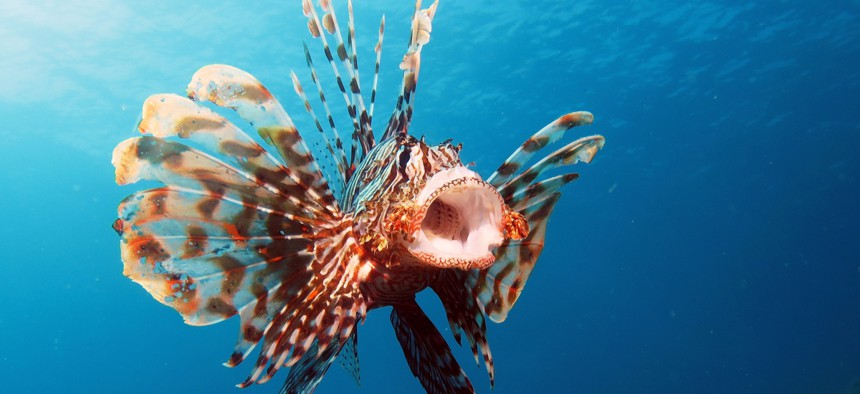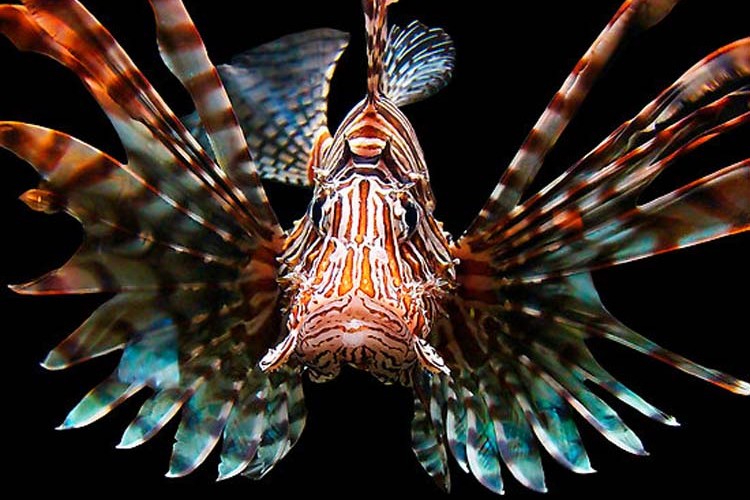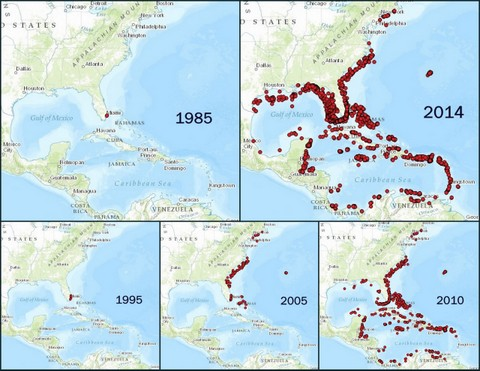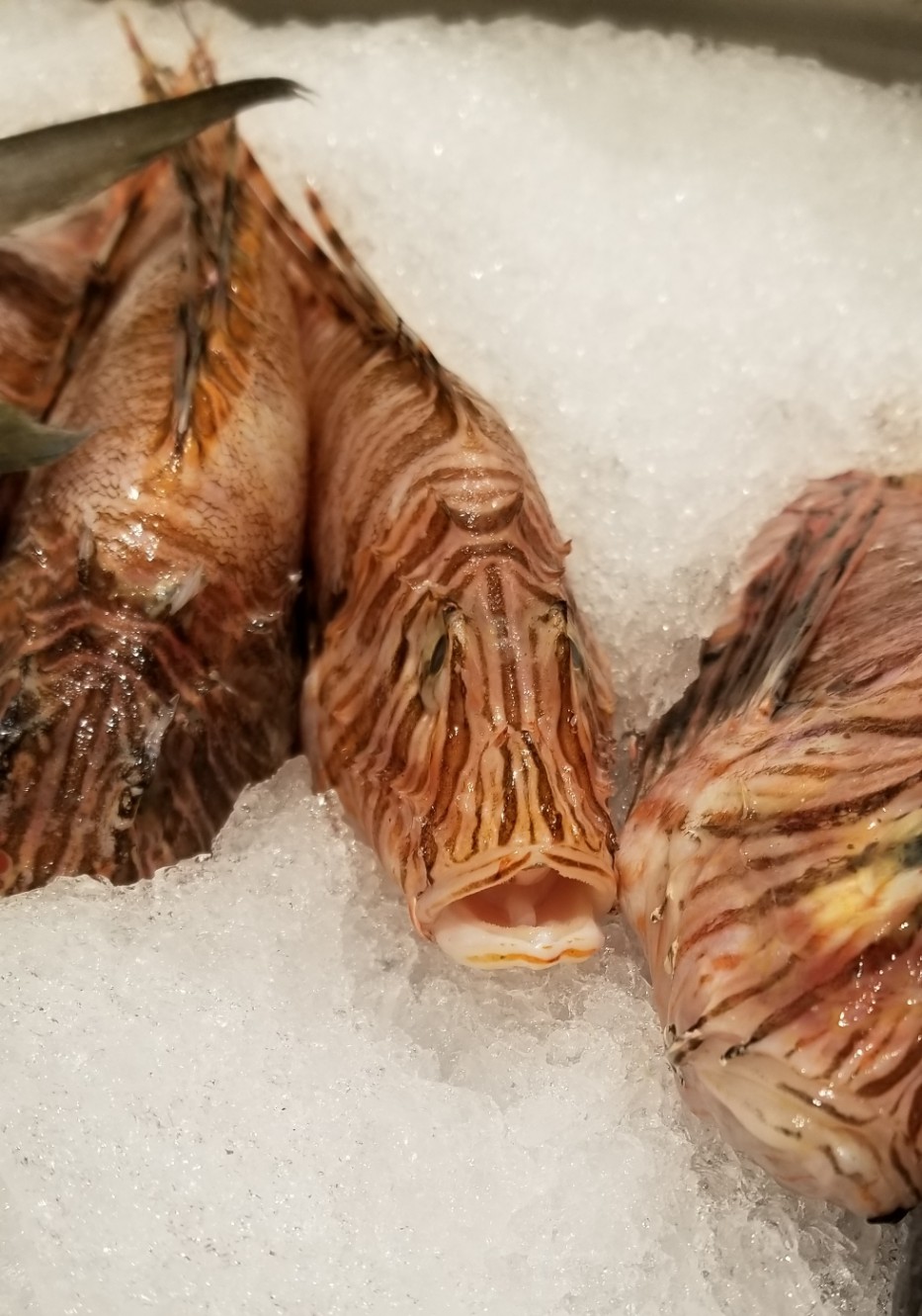Becoming the Lionfish King

The fish is native to the Indo-Pacific region and is covered in venomous spikes. Shutterstock
The state of Florida encourages divers to remove an invasive species of fish from its waters in an annual challenge, naming the winner the Lionfish King (or Queen).
The best place to hunt lionfish, according to John McCain, is on virgin shipwrecks.
Those spots—places where no one has dived before—are teeming with stripey, spiny swimmers who haven’t yet learned to be scared of humans. It is, quite literally, like shooting fish in a barrel.
“When the densities were the highest, you’d drop down and get a couple hundred fish, or a couple hundred pounds of fish, in one spot on one dive, in 30 to 40 minutes,” said McCain, a diver and spearfisher. “Literally, you shoot a fish and there’s another one 2 inches from it, and the second one doesn’t even move.”
McCain should know. He’s the state of Florida’s reigning Lionfish King, the winner of last year’s Lionfish Challenge, a statewide competition that offers prizes to divers who spear the highest counts of the invasive species. The contest began in 2016 as part of a push by the Florida Fish and Wildlife Conservation Commission to educate residents about the fish, which began proliferating in state waters in the mid-1980s.

No one’s quite sure how they got there, though the domestic population are likely descendants of unwanted aquarium fish that were released into the wild, said Amanda Nalley, a spokeswoman for the commission. Lionfish reproduce quickly, are voracious eaters and have no natural predators, so the potential for environmental havoc is high. Off the coast of Florida, they are found in both the Atlantic Ocean and the Gulf of Mexico.
“This is the first time we’ve had such a successful nonnative invasive species in the marine habitat off our state,” Nalley said. “It’s a hardy fish. It can tolerate a variety of temperatures, depths and salinities. They tend to eat pretty much anything and they eat a lot, plus their population is growing. And they don’t seem to have anything keeping them in check other than us.”

Because lionfish tend to hang out on reefs and other submerged structures, spearfishing is the best way to catch them. The commission encouraged divers to remove them when possible, but diving is an expensive hobby, and many divers saw little incentive to spend the time or money to target lionfish. So three years ago, the state decided to give them one.
“We felt it would be a great way to encourage removal, bring awareness to the issue, and incentivize those who want to do it,” Nalley said.
Thus began the Lionfish Challenge. That first year, participants who caught at least 50 lionfish received a commemorative coin and a T-shirt, while the lionfish king—the diver who speared the most fish—nabbed a lifetime saltwater fishing license and a photo on the cover of Saltwater Regulations magazine. The commission has upped the ante each year since, and prizes this year include a trophy, placement in the FWC hall of fame, SCUBA cylinders and air fills, and a $2,000 cash prize for the participants who bring in the smallest and largest lionfish.
.jpeg)
The incentives are great, McCain said, though they’re not the only reason he participates. There’s also the thrill of competition, the knowledge that your hobby is helping the environment and, perhaps surprisingly, camaraderie. The Florida lionfish community, it turns out, is fairly tight-knit.
“We enjoy spending time together, and that’s probably the thing I take most from it,” McCain said. “You win money, and that’s great too, but you definitely form a bond with someone when you spend 16 hours on a boat with them two days over.”
Participation is free and open to anyone. Recreational divers start the process by uploading a photo of the first 25 fish they’ve speared, but after that, catches must be verified at checkpoints. The preferred method of submission is slicing the tails off the fish, placing them in a plastic bag, and handing them over. (This isn’t as cumbersome as it sounds, McCain said—roughly a hundred tails can fit in one sandwich bag.)
Those tallies are added to an online leaderboard, though the standings may not always be entirely accurate—gamesmanship demands that participants strategically hoard their fish tails during the four-month competition to keep their rivals in the dark. (Some divers have entire refrigerators devoted to this, Nalley said.) Last year, McCain bagged 1,137 lionfish to score the title of Lionfish King. As of Thursday, he was in third, two spots behind current frontrunner, who had caught 725 fish.
Participation in the challenge has increased each year, from 95 people in 2016 to 120 in 2017 and 166 last year. Divers caught 71,323 lionfish in those three competitions, comprising roughly 13 percent of the more than 540,000 that have been removed from state waters since 2014.
At least some of those have been served for dinner, a somewhat recent development that accelerated in Florida when Whole Foods began selling lionfish at its seafood counters. The meat is white, buttery and flaky, and tastes similar to hogfish, grouper and other non-fishy fish. Still, it took a bit for lionfish to take off as a viable menu option, most likely due to misunderstanding about its venomous spines.

“Initially there was a lot of concern about that, but the venom is not in the meat,” Nalley said. “It’s in the spines only, and it’s neutralized by heat.”
There is no state-sanctioned lionfish population count, but officials have noted anecdotal evidence that the species has declined since the educational push began. Some of that may be coincidental timing—hurricanes may have helped deplete some populations, and a mystery ailment was plaguing lionfish as recently as February—but the challenge, at the very least, hasn’t hurt the cause.
“We’re hearing from divers that they’re seeing less lionfish in reefs that are frequently visited,” Nalley said. “There’s been so much talk about lionfish so people are more aware of it. Divers are getting out there, people are asking for it in restaurants, and we are showing positive impacts. So that’s a good sign.”
Kate Elizabeth Queram is a Staff Correspondent for Route Fifty and is based in Washington, D.C.
NEXT STORY: Juul Hires Leading Teen Addiction Researcher As Medical Director





